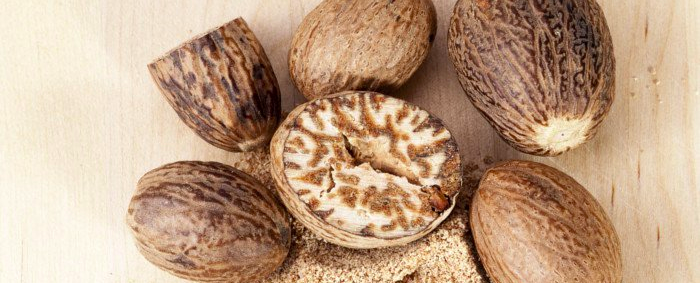
Nutmeg is a spice with a warm, slightly sweet flavor that should be used sparingly because it is powerful. It is found in many dishes and in sauces such as béchamel. It is also used for its health benefits.
Characteristics of nutmeg:
- Alleviates digestive disorders;
- Facilitates digestion;
- Source of copper, iron and zinc;
- Source of antioxidants;
- Participates in bone consolidation.
What is nutmeg?
Identity card of nutmeg
- Type: Spice;
- Family: Myristicaceae;
- Origin: Indonesia;
- Brown color ;
- Flavor: Warm, slightly sweet.
Composition of nutmeg
The nutmeg is the ovoid fruit of the nutmeg tree, a tropical tree that can reach fifteen meters in height. Nutmeg is small or medium in size and ranges from light beige to brown.
During the harvest, the nutmeg is surrounded by a shell which separates in two in the middle.
Word from the nutritionist
Nutmeg is a spice that is used in small quantities, the nutrients present in this spice will therefore be provided in minute quantities and should not replace a balanced diet.
Nutritional values
For 100g of nutmeg:
| Water | 6.22 g |
| Carbohydrates | 28.5g |
| Fat | 36.3 g |
| Protein | 5.3g |
| Calcium | 184 mg |
| Copper | 1.03 mg |
| Iron | 3.04 mg |
| Magnesium | 183 mg |
| Zinc | 2.15 mg |
| Vitamin B9 | 76 µg |
| Energy | 507 kcal |
| Energy | 2100 kJ |
Benefits of nutmeg: why eat it?
- Nutmeg helps to alleviate digestive disorders (especially nausea, diarrhea and stomach pain) and promote good digestion.
- Consumed in high doses, nutmeg can reduce pain, however nutmeg also has significant psychotropic effects and it is strongly advised against this fact to take a dose greater than 5g.
- A key element in the consolidation and maintenance of bone density, calcium is found in nutmeg in considerable quantities.
- The presence of copper in the nutmeg will help you fight stress and help maintain your enzyme system.
- It is the transport of oxygen in the blood which will be favored by the iron content of nutmeg, so remember to decorate your dishes with this spice to fight against anemia.
- The zinc content of nutmeg will ensure good cell renewal and will also play an antioxidant role by trapping free radicals.
- Nutmeg also has anti-inflammatory and antiseptic properties. Its essential oil can be used to relieve muscle pain.
- Nutmeg relieves respiratory conditions such as bronchitis, flu and other sore throats.
How to choose your nutmeg
You will find the whole nutmeg, to grate yourself to best preserve its flavors. For convenience, it is also already reduced to powder.
A good nutmeg should be brown and dry.
Keep well
For an optimal conservation, prefer an airtight jar, protected from light, humidity and heat.
Preparation of nutmeg
How to cook it? How to match it?
It can be used grated or powdered, you can integrate it into your recipe at mid-cooking or at the end of cooking.
We find nutmeg in spice mixes such as curry, the 4 spice mix or even spices for gingerbread.
It will be particularly good with mashed potatoes, meat dishes or soups. It is also an essential ingredient for the success of a béchamel, a gratin dauphinois or a classic Lorraine quiche.
Side effects
Nutmeg can be fatal if consumed in large doses, it was noted that a dosage of 20g was lethal.
History of nutmeg
Nutmeg is native to Indonesia. She arrived in Europe in the 15th century thanks to the Portuguese and the Dutch. The nutmeg tree was also exported to the West Indies for cultivation.
In the 16th century, the nutmeg was used as a sedative for the slaves of merchant ships to relieve pain, for which they were generally punished.
For further
Gardening
To grow, the nutmeg tree needs a partial shade, hot and humid. The soil must be deep, rich and sandy.
Pay attention to mealybugs which are the main predators of this plant.